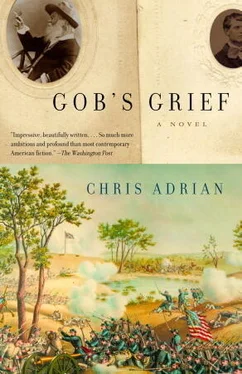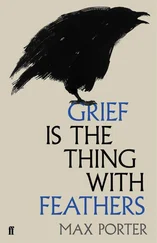THOMAS JEFFERSON WOODHULL WAS ELEVEN YEARS OLD when he ran away from home to join the Union army. One night in August of 1863, he sprinted down a white road that seemed to bloom out of the darkness as a bright moon climbed higher and higher in the sky above him. He was in a hurry to catch the train that passed a mile east of the shack where he lived with his brother, his mama, and her family, the notorious Claflins of Homer, Ohio.
The train was halfway gone when he got to the tracks. Tomo ran alongside the boxcars, cursing at the top of his voice. “You shit for a train won’t you just stop?” He would have been grateful for just a bit of slowing. But the train moved on speedy and serene. He wished he had a gun to shoot it with.
Glancing back, Tomo saw that the caboose was coming up fast. He cursed again, louder and fiercer, the curses escalating into a wordless howl as he threw himself up at an open boxcar, managing a precarious grip, which he knew he must lose in a moment because he was not strong enough to hold on. He had resigned himself to slipping away, and launched a final “Shit on you!” at the train, when suddenly a set of pale hands came out from within the car and hauled him up and in.
“Why are you making all that racket?” asked his savior, who was just a dark shape until he put Tomo down and turned up a lamp. The man had brown hair and bright blue eyes, and fat lips so red that they seemed stolen from a girl. “Why are you being so noisy? Do you know I was trying to sleep?” He spoke, like Tomo’s grandmother, with a heavy German accent.
“I didn’t think I was going to make it,” said Tomo.
“Where are you going, that you call a train a shit and wake a poor soldier from his sweet dreams?”
“To the war,” said Tomo.
“The war? I think you had better go home to your mama, little Fenzmaus.” His fellow passenger started to push Tomo toward the door, telling him to roll when he hit the ground. Tomo spun away, out of the man’s grip, and threw himself to his knees on the rough floor of the car.
“She’s dead!” Tomo cried. “My mama’s dead, with my papa and my brother and my aunts, my uncle and my granny and grampy! We all got the typhoid and I ought’ve died too, but I didn’t, ‘cause I’m the damned unluckiest boy who ever breathed a breath. Throw me out! Go on! I don’t care. It’s all shit anyhow. I’ll just lie down by the tracks and die.” Tomo dropped down on his stomach with his head on his arms, and wept with great drama, peeping up a little to see the man standing above him with both hands on his head, as if holding a hat down against a high wind. It was all a lie. Tomo’s family were sleeping peacefully in the falling-down shack they called home. His twin brother ought to have been with him, but he wasn’t. He’d stayed in Homer for the sake of cowardice. Tomo pounded his fist against the floor in imitation of despair, but really it was rage against his brother that moved his hand.
“I …” the man said, kneeling down to touch Tomo on the shoulder. He stood up and crossed the car, then came back to kneel again, and push something gritty against Tomo’s wet cheek. “Would you like a cookie?” he asked. “My little Frieda baked them, so I could take them back to my Niners. Do you see? Do you see the nine?”
Tomo sat up and took the thing. It was a molasses cookie, fully half the size of his head, and stamped like a coin with the number nine in the center. Still crying his false tears, Tomo bit, chewed, and swallowed.
“Do you like it?” asked the man.
Tomo nodded.
“Children and soldiers, they both love cookies. Poor Fenzmaus. Haven’t you got anybody to watch over you?”
“Don’t need nobody,” said Tomo.
“No family. Not anywhere?”
“Just Betty.”
“Betty? Is that your sister?”
Tomo shook his head. “My horn,” he said, indicating the bugle that hung at his side. He put her to his lips and blew, not a military tune, but something sad and angry that he made up on the spot. The man leaned back on his heels and covered his eyes with his hands. “I know camp music, too,” Tomo said, and played “Boots and Saddles.” Tomo was a splendid little bugler — he knew all the drill calls, be they for bugle or fife, for cavalry, infantry, or artillery. He could play anything if he heard it once.
“So pretty!” declared the man. “Play me another.”
Tomo played and played, until it was almost dawn, and the man said it was time for them to go to bed. They had become acquainted, between songs. The man’s name was Aaron Stanz. He was a private on French leave from the Ninth Ohio Volunteers, who were camped in Tennessee, awaiting orders from General Rosecrans. In a contest of lots Stanz had won the privilege of visiting his young wife, whom he had not seen since he kissed her goodbye at Camp Harrison in the summer of ’61. “How long can a man and his wife be apart?” he asked Tomo, who said, “Always,” because he was thinking of his mama and papa, divorced since before the war.
The Ninth, as it happened, was short on field musicians. And Company C, from which Aaron Stanz hailed, had only a drummer; their fifer had died at Hoover’s Gap. Tomo closed his eyes and had a brief vision of departing horses — it had been his hope to bugle for a cavalry regiment — but then he said he felt it was divinely sanctioned that he go and bugle for Company C. Aaron Stanz said he did not believe in God, but admitted the convenience of the arrangement. It would not be traditional or entirely in accord with regulations, having a bugler instead of a fifer, but he was sure Captain Schroeder would agree that Tomo must do in this pinch. Anyhow, though there were no angels except in the minds of men deranged by their religion, Tomo blew like one, and Aaron Stanz could not imagine that the Captain would resist the charms of Tomo’s bugling.
When it was time for bed, Tomo lay down on Aaron Stanz’s rubber blanket, and tried to sleep with his head pillowed on that man’s arm. He complained that it was too bright to sleep, and that he wanted to go look at green Kentucky passing by outside the door. Aaron Stanz put his cap over Tomo’s face, and called him Fenzmaus again, which was pipsqueak — Tomo’s grandmother Anna called him and his brother that sometimes, though never with such gentle affection as Aaron Stanz invested in the word. Eventually, Tomo drifted to sleep, lulled by the steady noise of the train, but shortly woke with a start from a dream of falling. The cap fell from his face, and he cried out softly. Tomo reached around him for his brother, away from whom he had never spent a single night. But then he remembered how Gob was back in Homer, afraid of the war and the great wide world.
The journey south was uneventful, except for a stop in Tullahoma, where a soldier poked his head into the car and made a perfunctory search while Tomo and his new friend hid behind stacked barrels of salt pork. “He wouldn’t understand my special arrangement,” said Aaron Stanz.
They arrived at Camp Thomas, after rolling from the train near Winchester and walking for some five miles, during which time Aaron Stanz was always supremely certain of his way. He was welcomed in camp not like a technical deserter, but like a hero. Stanz’s welcome had to do with his popularity — it was immediately obvious to Tomo that he had had the good fortune to fall in with the best-liked fellow in his company — and with the gifts he brought back. In addition to his wife’s molasses cookies, he’d brought two sacks stuffed with roast turkeys and soft bread, new boots for three men (each boot filled with candy and chewing gum), and best of all a small barrel of cool beer. The Ninth Ohio was an all-German regiment, and every man in Company C greatly missed his beer. There was little opportunity to get any in the wilds of Tennessee.
Читать дальше












